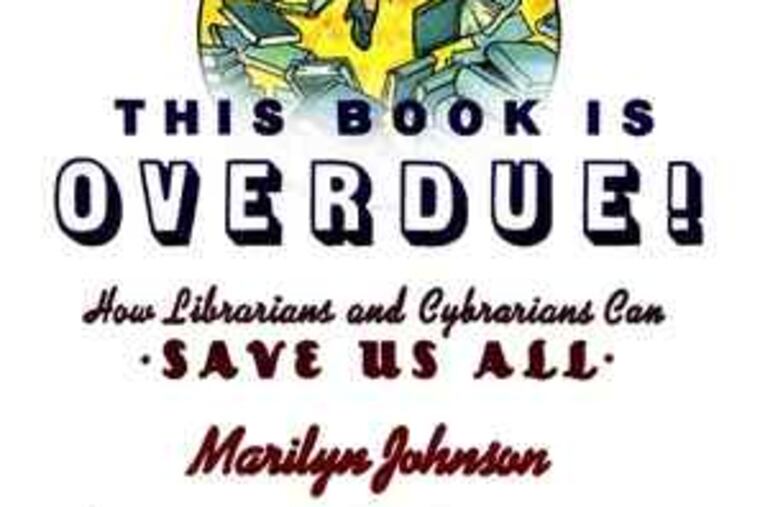A lively volume about librarians
Marilyn Johnson discovered the innate awesomeness of librarians while researching her previous book, The Dead Beat, in which she looked at the work culture of obituary writers. The most interesting obits, she said, were consistently those of librarians, with their wide-ranging interests and quirky talents. She wanted to write about them.

How Librarians and Cybrarians Can Save Us All
By Marilyn Johnson
Harper. 288 pp. 24.99 nolead ends nolead begins
Reviewed by Katie Haegele
Marilyn Johnson discovered the innate awesomeness of librarians while researching her previous book, The Dead Beat, in which she looked at the work culture of obituary writers. The most interesting obits, she said, were consistently those of librarians, with their wide-ranging interests and quirky talents. She wanted to write about them.
And she has tackled the subject of librarianship with the same verve as she did that other unlikely profession, easily sussing out the best people to talk to.
That she enjoyed the task is clear in her tone, which is enthusiastic and chummy. At first, though, I found it ingratiating. Did Johnson think she needed to convert a world of unbelievers whose only image of librarians includes a severe bun and a personality problem? People whose job it is to guard a resource that properly modern people don't care about anymore?
Well, maybe she does. She mentions a 1996 report released by the Benton and Kellogg foundations, which found that the public viewed libraries as obsolete emblems of prestige, nice but unnecessary. But this "public" consisted of the 11 Caucasian, middle-class, middle-aged people in the focus group. Johnson cites the study early on, then sets about proving, winningly, that we need librarians, especially now. In a world glutted with ideas, where most graduate library programs have renamed themselves information science, librarianship is extending its reach. The librarian has left the building.
Johnson says new technology was the big draw for her in writing this book. She fetishized the "intellectual, cerebral, almost disembodied nature of the subject of librarians in the digital age" - so much so that she was sometimes dismayed by the very, um, human elements of many librarians' day-to-day existence. (One time at a library in Rhode Island, she learned, "someone pooped in the book drop.")
She rhapsodizes about the truly incredible things happening between libraries and the communities they serve. She reports on Radical Reference - the online information source staffed by professional librarians who serve the research needs of independent journalists, activists, and sundry interested folk. She interviews one of its founders, Jenna Freedman, coordinator of reference services at the Barnard College library. (I should say here that Freedman is a friend of mine, though it was a surprise to find her in these pages.) Radical Reference came into being during the 2004 Republican National Convention in New York, when Freedman and colleagues provided on-the-street resources to protesters, including a mass text-messaging service and on-call librarians with access to reference materials.
On her visit to Barnard, Johnson discovered the circulating zine collection Freedman maintains, and she soon became fascinated with the low-fi, photocopied publications. A good librarian, Johnson wants us to know, gets the best use out of both the old and the new.
Of course, library professionals don't always agree on the finer details. Johnson devoted a chapter to the New York Public Library at 42d and Fifth in the hope of capturing "someplace you could see change happening." The NYPL still uses its pneumatic pipe system; a reference librarian will take your book request on a slip of paper and send it flying the length of the building in one of those nifty brass tubes. Yet it also hosts about 600,000 images from the collection that have been meticulously photographed, cataloged and uploaded to its Web site.
Johnson meets the frustrated former head of the Asian and Middle Eastern Division, whose reading rooms have been permanently closed. The administration favors circulation over reference, and prefers the image of the library as a public space that's bouncing with patrons and programs for kids. She also meets Joshua Greenberg, who created the NYPL's interactive Web site and hired other librarians who straddle the digital-codex divide.
Greenberg says, " 'We're not concerned with digital technology for its own sake. We're not concerned with the collections for their own sake. We're concerned with people's experience.' "
His comment might hit the heart of the matter, the point Johnson keeps circling with her bright biographies and entertaining first-person narratives. The librarian's job is to help you. You the end-user, the library patron, the person Freedman prefers to call "reader" rather than "customer," even as many public libraries adopt a business model and attendant terminology.
The idea of librarian-as-civil-servant illuminates the book's most rousing chapter, which tells the story of the Connecticut Four, a group of librarians who received letters from the FBI demanding access to records of patrons' computer use - and also demanding that they keep the letters themselves a secret.
This action violated library confidentiality laws and rulings in every state of the union, but it was supported under the Patriot Act. The Four refused the FBI access and challenged the Patriot Act by suing the government, during which time they were under a gag order, unable to talk about what had happened. Now that the case is out of the courts - with the Act only slightly altered - they're telling their tale widely. Its moral is clear: This could happen to you.
Because of Johnson's bright personality and the brightness she sees in her subjects, her book is charming, fairly brimming with ain't-it-cool news. But her underlying message is serious and cautionary. With their seemingly inexhaustible enthusiasm for understanding their world, the librarians were ready-made rebels, prepared for threats against our right to knowledge and privacy. As Johnson has it, "They had planned for the knock on the door."